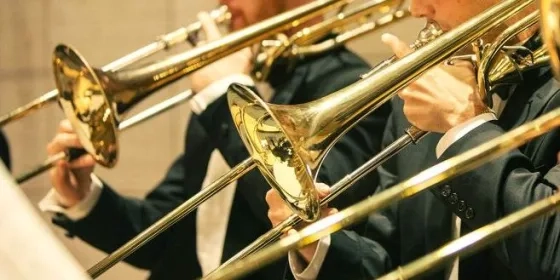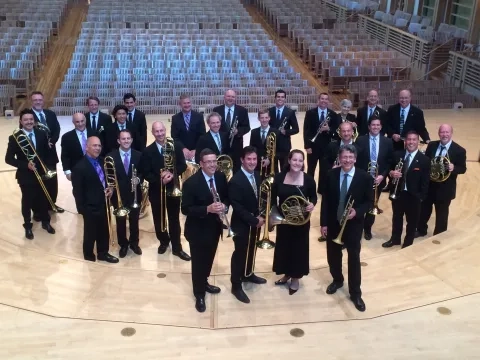Sound the Horn: How the National Brass Ensemble Returned to SFCM
How some of the best brass players in the country came to convene at SFCM this summer—and why it's such a unique undertaking.
By Alex Heigl
The journey to bring brass musicians from seven major US cities together began with a single album.
The 1968 album The Antiphonal Music Of Gabrieli, featuring principal brass from the Chicago Symphony, the Cleveland Orchestra, and the Philadelphia Orchestra, to be precise. That record, National Brass Ensemble (NBE) Artistic Director Michael Sachs explained, is, for musicians of his generation, “kind of the Mount Rushmore of American brass players.”
“It was a big inspiration for a lot of us,” Sachs reflected. “But it was one of those things where they got together for a couple of days, recorded this thing, never played a concert, never did anything after that.”
It wasn’t until Sachs arrived at his current position as principal trumpet at the Cleveland Orchestra in 1988 that conversations with Michael Mulcahy (second trombone, Chicago Symphony) about the notion of creating an updated version of that summit began to take shape.
Enter the family Martin: Christopher (principal trumpet, New York Philharmonic) and Michael (fourth/utility trumpet, Boston Symphony), who, along with their father Freddy, put together the National Brass Symposium in Atlanta in 2011 and 2012 that featured seminars, masterclasses and concerts.
“When they put that together, we started thinking, how could we do something similar but broaden the representation?” Sachs continued. At this point, SFCM President David Stull, then at Oberlin Conservatory—where Sachs’ wife, harpist Yolanda Kondonassis, was teaching—got involved. The pair discovered their mutual love of the Gabrieli recording, which led to a 2014 gathering in Sonoma to record a new version of the Gabrieli works (arranged by SFCM trombone professor Tim Higgins) along with a new work by famed composer John Williams.
“David is a unicorn,” Sachs enthused. “There are very, very, very few people in this business who I have been more impressed with. He sees opportunity and possibility where other people see impossibilities.”
But getting what Sachs called “the Rubik’s cube” of so many prominent (and busy) players together proved to be exactly as challenging as one would think, and so the next scheduled gathering was scheduled for June of 2020, which the COVID-19 pandemic obviously precluded.
Two years later, the event has expanded to not just the education-focused Academy (an element not present at early gatherings), but an ambitious performance in conjunction with the San Francisco Symphony at Davies Hall. That evening will include works by Aaron Jay Kernis, jazz trumpeter Arturo Sandoval, and a new Richard Wagner “Ring” compilation arrangement by Higgins, along with a commission from Jonathan Bingham, awarded as part of SFS and SFCM’s Emerging Black Composers Project in 2021.
The personnel for the performance has swelled from 26 to 33, with brass augmented by percussion, harpists and an organist. Stull, a tubist himself, is as excited about the NBE’s return as any brass superfan: “The biggest, baddest, brass ensemble in the world is coming to Davies Hall for a singular performance of new works that are dazzling in scale, virtuosity, and complexity."
For the educational portion, Sachs said, the goal was to avoid a standard model divvied up by instrument. “We wanted to do things where there was cross-pollination, a class where it would be trumpet, timpani and snare drum talking about their partnership in the orchestra, or classes in which trumpet students would be taught by horn teachers and vice versa.”
“I wanted to really utilize a lot of the personal relationships already in place,” he added. “A lot of these people have worked together in other places—and for me personally, I’m dear friends with a lot of them—or may have studied with the same teacher or come from the same lineage. There's a lot of common ground here to mine to make sure students get something they wouldn’t elsewhere.”
Sachs admitted that this spirit of collaboration is something of a break with tradition. Players from previous eras, “kind of kept to their own group … and I wanted students to see us all working together, all getting along. I get questions like, ‘Oh, well how does so-and-so principal feel about playing the second part here?’”
“They don’t care. There’s no egos here. People are friends, having a good time, inspiring each other. That’s what I hope the legacy of this group is.”
Stull doesn’t mince words when the Academy, concert, and recording are concerned: “Much like that passing of a comet, when the NBE assembles for a show, it is not to be missed. We are boundless in our anticipation of this performance and look forward to a fabulous week with this extraordinary group of artists!”
Find out more about the NBE performance at Davies Hall here and the personnel involved in this one-of-a-kind performance.

